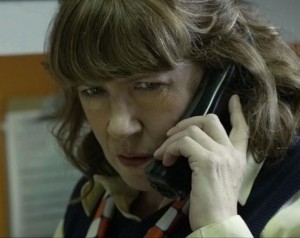 Craig Zobel’s Compliance has gained international attention, but I wonder whether it is the attention he was looking for. In screenings around the world, including right here for the London Film Festival, people have walked out of the cinema whilst a US critic suggested that this is the ‘most disturbing film ever made.’ One female audience member said that the film was trying to make violence against women ‘entertaining’ before leaving the screening. Most interestingly is that this isn’t a gory horror, a made-for-thrills film, made just to horrify the audience in that moment but never to be thought of again, no, Compliance is making it’s name for being a tough, hard hitting, psychological thriller based upon a true story.
Craig Zobel’s Compliance has gained international attention, but I wonder whether it is the attention he was looking for. In screenings around the world, including right here for the London Film Festival, people have walked out of the cinema whilst a US critic suggested that this is the ‘most disturbing film ever made.’ One female audience member said that the film was trying to make violence against women ‘entertaining’ before leaving the screening. Most interestingly is that this isn’t a gory horror, a made-for-thrills film, made just to horrify the audience in that moment but never to be thought of again, no, Compliance is making it’s name for being a tough, hard hitting, psychological thriller based upon a true story.
This highly claustrophobic and low budget thriller is based upon the strip search prank call scam, where a series of phone calls were made to fast food restaurants in the US, and a caller pretending to be the police scammed managers into strip searching and harassing staff before people realised what was going on.
In Compliance, we see busy manager Sandra (runaway performance of the year by Ann Dowd), receive one of these calls from a man pretending to be a Detective Daniels (the haunting Pat Healy). Daniels suggests that one of the waitresses, Becky (the devastatingly beautiful Dreama Walker) stole money from the purse of a customer who has now complained to the police. He instructs Sandra to get Becky into the back office, where her humiliation begins. From the initial shock of being accused of stealing, to having her personal belongings searching; the first act of the film is setting up the direction for the rest of the film. We know that nothing is going to stop this prank call, and the audience understands from the very beginning that if you think a policeman is telling you to do something, well, you do it. This is reminiscent of a study by Milgram where he questioned, that if someone in authority tells you to do something, does one abide the rules even if it’s against their conscience.
For the first part of the ‘interrogation’, Sandra appears to be on the side of Becky. She is trying to keep her calm in the restaurant, as well as looking after her employee against this accusation. As well as this, the claustrophobia of the piece begins – practically the entire film takes place behind the counter in the fast food joint, and most of that is specifically in the back office. The audience are therefore alienated from the real world outside these employees, and therefore there is an impending sense of intensity to the piece and suspense, which gradually builds. The second act of the ‘interrogation’ begins when Daniels suggest that Becky should be stripped searched. Sandra is initially unsure about doing this, but with another worker in the room, they strip a teary Becky to see nothing has been stolen.
restaurant, as well as looking after her employee against this accusation. As well as this, the claustrophobia of the piece begins – practically the entire film takes place behind the counter in the fast food joint, and most of that is specifically in the back office. The audience are therefore alienated from the real world outside these employees, and therefore there is an impending sense of intensity to the piece and suspense, which gradually builds. The second act of the ‘interrogation’ begins when Daniels suggest that Becky should be stripped searched. Sandra is initially unsure about doing this, but with another worker in the room, they strip a teary Becky to see nothing has been stolen.
From this point onwards, the story starts to become more thrilling and more contemplative. Daniels tells Sandra that he is doing a wider investigation into Becky’s brother, who has had trouble with the law before. He think that Becky may be in on it, and therefore she needs to be kept in the back office. At this point, the film is becoming something so much more, as Zobel is suggesting to the audience that knowledge is far too easily known. How does this seemingly random pranker know her brother and that he has had issues with the law in the first place? We now live in a world of social networking and media, where all our information is stored on Facebook and Twitter and many others; where people can easily access you and take advantage of the information that they know.
The story continues, but the further into the story we go, the less kind Sandra becomes towards Becky – whether this is her starting to think that she is guilty or it’s simply the stress of a busy day getting to her. We see Becky slowly get more alone in this nightmare. Even later on, Becky is left with Sandra’s fiancée, Van (Bill Camp), who is told by Daniels to remove the apron from the girl, check her behind when she leans over and finally ending it with a terrible, disturbing moment of sexual abuse.
Compliance is something of a marvel of a film, like those thrillers before it with something intelligent to say, the film takes the audience on a very intimate trail to what becomes the most likely of climaxes. The audience are fully aware of where the story is going, there are pointers throughout about the misogynist elements of Daniels and of the film itself and the ways in which it deals with women, but I feel it can be forgiven these small faults for the bigger picture. The film ends with a message stating over 70 similar incidents occurred in 30 US states.
 As far as the image itself goes; the film is not particularly stylised and it’s quite clear more attention is paid to the narrative rather than the filming or editing, which although it seems effortless, doesn’t stand out as anything special. The camera, for the most part is non judgemental and passive in the story, as oppose to making the audience complicit in what is going on – it’s quite clear we are simply told to watch the drama unfold. This I suppose, is a lucky break for the film because I think if the audience knew more about Daniels or were actually forced to become involved in the abuse shown towards Becky, the film would have emptied out the cinema even further. The colour is somewhat saturated on screen, and very bland, owing to the emptiness of the surroundings. The intensity of the story has quite literally drained everything else on screen, even down to sound which is usually quite bare.
As far as the image itself goes; the film is not particularly stylised and it’s quite clear more attention is paid to the narrative rather than the filming or editing, which although it seems effortless, doesn’t stand out as anything special. The camera, for the most part is non judgemental and passive in the story, as oppose to making the audience complicit in what is going on – it’s quite clear we are simply told to watch the drama unfold. This I suppose, is a lucky break for the film because I think if the audience knew more about Daniels or were actually forced to become involved in the abuse shown towards Becky, the film would have emptied out the cinema even further. The colour is somewhat saturated on screen, and very bland, owing to the emptiness of the surroundings. The intensity of the story has quite literally drained everything else on screen, even down to sound which is usually quite bare.
The performances from both Dowd and Walker as the two main characters are especially enlightening in a very dark film. They both contend with and express a wide range of emotions throughout the film; and they work together, at first to bounce from one to the other and later in anger with each other. Dowd’s character, Sandra, especially is put into a morally questionable situation during the film but she continues through the film trying to assume a sense of power and authority but in the end, she is as full of flaws as the fake police officer.
This film causes the audience to ask some very interesting questions; about authority, our reservations towards it and our reactions when put into a situation, which makes us uncomfortable. Furthermore, we are being asked things about our own privacy and our own rights in the technological age we live in – what are our rights now? I would highly recommend Compliance, as a stunning piece of set drama asking some tough questions. It’s a film without hyperbole, but instead with a role in a very fast paced, ever changing world.
Follow Ollie on Twitter @olliecharles




